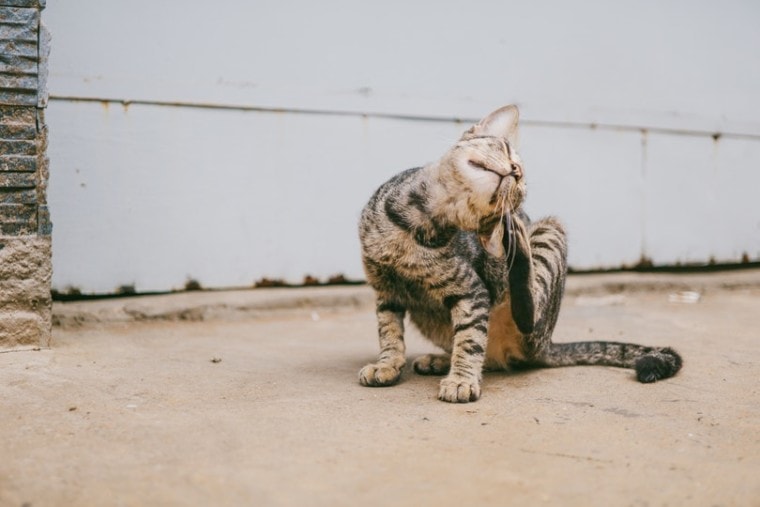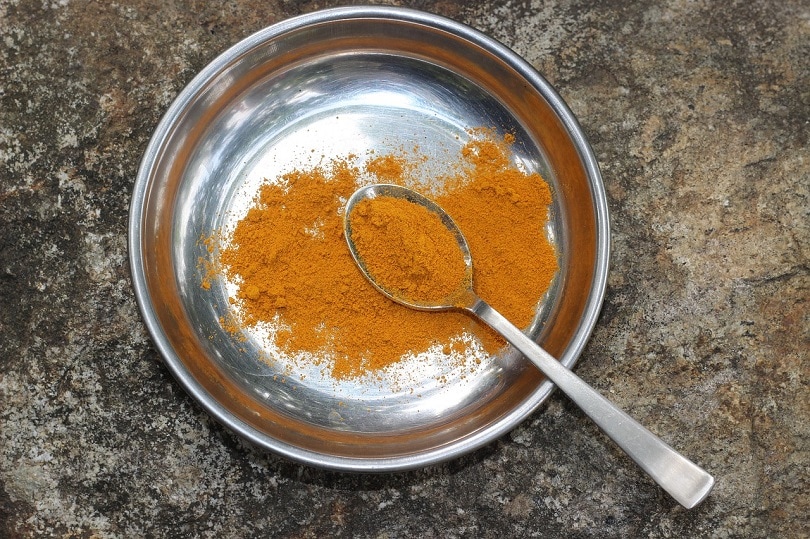
Note: Home remedies are not an alternative to professional medical advice. If your pet has a serious issue, please consult your vet immediately.
If you’ve owned cats for any extended period of time, you’ve likely come across small, bald spots on your cat’s skin at some point. This is known as ringworm, but despite the somewhat misleading name, ringworm is not actually a worm, but rather a fungal infection. The disease is fairly common in cats and is caused by three different species of fungus.
Cats most commonly get ringworm on their face, head, paws, and tail, and although the disease is most common in young cats, older cats are susceptible too. This fungal disease is highly infectious and is spread through the air via tiny spores, and it can quickly spread all over your cat’s body and to you and your family.
Fortunately, there are home remedies that can help slow and even stop the spread of ringworm before it takes hold. Read on for eight home remedies for treating ringworm in cats.
The 8 Home Remedies for Treating Ringworm in Cats
1. Aloe Vera
Aloe vera has been long been used medicinally for its antifungal and antibacterial properties, and since ringworm is a fungal infection, aloe is a great option to try at home. It can help treat ringworm, and the gel can also help soothe the itchiness, inflammation, and discomfort of the disease. Aloe vera is readily available in topical gel form, but if you have the plant growing at home, you can simply cut open a leaf and apply the sticky gel right onto the affected area. About three times daily should do the trick.
One notable concern, especially if you are using fresh aloe, is that the outer edges of the leaf are filled with a white latex sap that can cause stomach issues in your cat if ingested. The healing gel inside is perfectly safe for cats, though.

2. Apple Cider Vinegar
Apple cider vinegar (ACV) is a scientifically proven antifungal that can work wonders on fungal skin diseases like ringworm and is perfectly safe for use on cats. It is easy to apply and inexpensive, and most health stores keep it in stock. Simply soak a small amount of diluted apple cider vinegar (2:1 water and ACV) in a cloth or soft sponge, and apply directly to the affected area. You can do this up to three times a day until the infection goes away.
3. Coconut Oil
Coconut oil has long been used topically and as part of a healthy diet, and it has been shown to have powerful antifungal and antimicrobial properties. The lauric acid in coconut oil has been proven to kill bacteria and yeasts and is even being used to treat drug-resistant candida in humans. Coconut oil is perfectly safe for cats, and since it has shown such promise with humans, there is plenty of reasons to believe that it can help your feline too. Simply apply it to the affected area two or three times per day, and even if it doesn’t heal your cat, their coat will look and feel great!

4. Lemongrass Oil
An inexpensive and simple home remedy, lemongrass essential oil is a potent antifungal, so it is a great option to use to help ringworm in your cat. However, cats lack a specific liver enzyme that helps break down essential oils, so the ingestion of undiluted lemongrass could be potentially harmful to your feline. Make sure to dilute it in coconut oil before applying, and try to make sure your cat doesn’t ingest any of it. That said, if it’s properly diluted and applied moderately, it shouldn’t pose any risk.
5. Myrrh Oil
Myrrh oil has long been successfully used in the treatment of fungal skin infections in humans, and it makes sense that it would work for ringworm on your cat too. Myrrh oil is an essential oil, many of which are dangerous for felines, but when applied in diluted form and in moderation, myrrh oil is perfectly safe and can potentially help clear up your cat’s ringworm.
6. Turmeric
Turmeric has anti-inflammatory and potent antifungal properties, so it can be a highly effective treatment for ringworm. Simply take freshly ground turmeric powder, mix it with water into a paste, and apply it to the affected areas and leave it there until it dries. One problem is that turmeric is one of the most contaminated spices in the world, and color is often added to it too, so it’s best to find organic turmeric wherever possible. That said, there are no safety studies in cats yet, although topical application should pose little risk to your feline.

7. Licorice Powder
Licorice has strong antiviral and antimicrobial properties, has been shown to be antifungal, and can be potentially highly effective for ringworm. Licorice also has many other potential health benefits for cats. Powdered licorice can simply be mixed with warm water to make a paste, and then applied to the affected area on your cat.
8. Soap and Water
If you have none of the above ingredients at home, simply bathing with soap and water can help stop the spread of ringworm, but it will not treat it. This method can be helpful until you get treatment for your cat. Just make sure to dry the areas thoroughly after washing because fungal diseases thrive in moist environments.
Conclusion
While most of these remedies have been proven to be antifungal, they have not been scientifically studied for effectiveness in ringworm in particular, so all efficacy is largely anecdotal. That said, many cat owners swear by some of these remedies and have had great success in using them. As most of these remedies are harmless to your cat, we think that they’re worth a try, but of course, medical advice from your vet is always the best bet.
Related Read:
- How to Get Sap Out of Dog Hair: 6 Vet-Approved Steps
- How Long Should You Quarantine A Cat With Ringworm? (Vet Answer)
Featured Image Credit: FOX, Pexels







